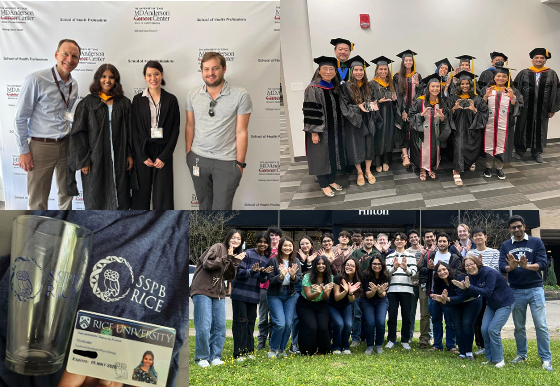Here's a fun fact about Houston: It's home to the largest medical center in the world, the Texas Medical Center (TMC), which covers over 2.1 square miles and includes more than 50 institutions dedicated to healthcare, research, and education. The TMC plays a significant role in advancing medical science and patient care globally. I graduated from MD Anderson Cancer Center School of Health Professionals with a Master’s in Diagnostic Genetics and Genomics (MS-DGG) in the summer of 2023 and began my PhD at Rice University in Systems, Synthetic, and Physical Biology (SSPB) that fall. It was not easy to leap from full-time clinical research to the new world of Synthetic and Systems biology. Working at MD Anderson Cancer Center, one of the largest medical complexes in the world, provided me with invaluable hands-on experience. During my master’s thesis at the Shelburne Lab in the Department of Infectious Diseases, I focused on studying the evolution of antimicrobial resistance in Klebsiella pneumoniae. This experience allowed me to dive deeply into creating and analyzing sequence alignments, ultimately transforming them into intricate phylogenetic trees. While my hands-on experience with wet lab techniques was limited at that time, I found my passion for computational analysis and data interpretation.
Although I have always aspired to pursue a PhD, I initially questioned my qualifications for a Bioinformatics or Computational Biology program, especially given the preference for candidates with computer science backgrounds. During my search for the right PhD program, I discovered the Systems, Synthetic, and Physical Biology (SSPB) PhD program at Rice University. This program integrates biological inquiry with rigorous quantitative mathematics and physics, making it an ideal fit for my interests and aspirations. The prospect of exploring complex biological systems through a multidisciplinary lens truly excited me. At the same time, I was also considering the Quantitative Biology PhD program at the MD Anderson Graduate School of Biomedical Sciences. Both programs offered unique opportunities, and I was drawn to the innovative approaches they embraced.
As the interview season approached, I felt incredibly fortunate to receive invitations for interview weekends at several prestigious institutions: Baylor College of Medicine for their PhD in Genetics and Genomics, the UTHealth MD Anderson Cancer Center for their GSBS PhD in Quantitative Biology, and course, the SSPB program at Rice University. Each opportunity represented a chance to delve deeper into the fascinating world of biological research and to meet inspiring faculty and fellow students who share my passion for interdisciplinary science. Each weekend brought its distinct flavor and atmosphere. At Baylor, I was captivated by the collaborative spirit among students and faculty, who emphasized genetics's importance in unraveling human health's complexities. At UTHealth MD Anderson, I found a strong focus on quantitative approaches to biology that resonated deeply with my aspirations. The emphasis on data-driven research methods and integrating computational tools within the biological sciences was truly inspiring. I left the weekend feeling motivated by the potential to contribute to groundbreaking cancer research. Finally, the SSPB program at Rice University felt like the culmination of everything I had been searching for. The interdisciplinary approach, combining biology with quantitative mathematics and physics, aligned perfectly with my vision for my future research. The faculty’s commitment to mentorship and the collaborative opportunities within the program reinforced my belief that this was the ideal environment for my academic growth.
Transitioning from a research-focused environment like MD Anderson to an academic setting has given me a unique perspective on the multifaceted nature of scientific inquiry. While both environments prioritize research, the dynamics, culture, and opportunities available in a university setting bring a different kind of richness to my academic experience. In an academic setting, the emphasis on teaching and mentorship is palpable. I’ve had the privilege of engaging with professors who are not only leading researchers in their fields but also passionate educators. The university environment also provides ample opportunities for personal and professional development beyond the laboratory.
From workshops on scientific communication to networking events with industry professionals, these experiences are invaluable for honing skills that will serve me well in my future career. I appreciate the balance between academic rigor and the supportive community that encourages growth in all aspects of student life. In many ways, being in a university setting feels like being part of a vibrant ecosystem that nurtures curiosity, fosters innovation, and prepares us to tackle the complex challenges of the future. Currently, I am a member of the Hilton Lab (https://hiltonlab.rice.edu/) at the Department of Bioengineering, where I study non-integrative approaches for cell and gene therapy. I am grateful for the opportunities this environment provides and excited to see where this journey will lead me in the world of science and beyond.
About the author:
Selva is a second-year Ph.D. student in the Systems, Synthetic and Physical Biology (SSPB) program. She works at the Hilton Lab, where they study how human cells function to design better genetic medicines and cell-based therapeutics to combat disease. Selva is originally from Madurai, Tamil Nadu (City of temples), which is located in the southern part of India. She moved to Houston for her master's at MD Anderson Cancer Center School of Health Professions in 2021.
Further Reading:
The Buckyball—A fortuitous discovery or a clever realization?
Exploring Houston One Cup At A Time
Time Management as a Ph.D. Student

